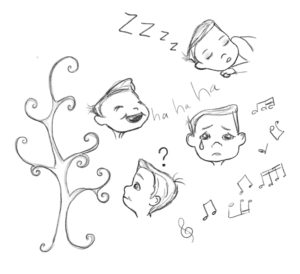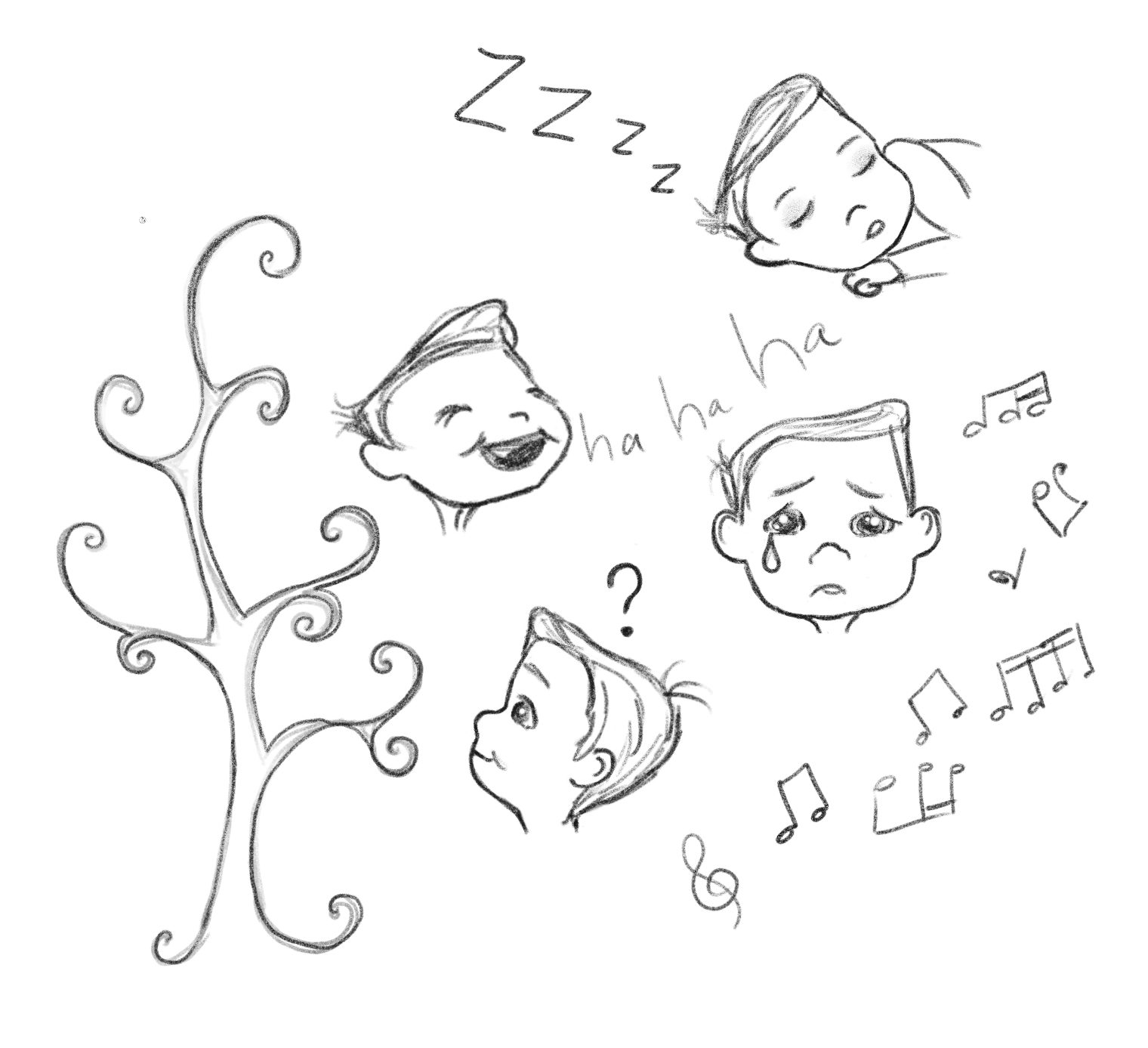March 6, 2018
One day while driving, my kids and I were listening to a collection of violin music when the theme song from Schindler’s List came on. Within five seconds, my then-four year old said “this is a sad song, Mom.” I asked him how he knew that and he shrugged. “I don’t know,” he said. “It just sounds sad.” That observation, simple enough to him, is something that has nagged at me for years. I played classical piano for over a decade, I listen to music of all sorts as often as possible, and every music class in grade school taught me that songs in a major key sound happy and songs in a minor key sound sad, and yet I still cannot explain how a certain distance between notes tells our minds to tell our hearts to feel happy or sad.
For that matter, why does a major scale, start to finish, sound satisfying to us, while a major scale that stops one note short sound unresolved? Why is the distance between C and D a correct-sounding interval, and not the distance between C and the slightly-sharp or slightly-flat version of D? How is it that sounds have any kind of meaning at all? I’ve played Clair de lune hundreds of times, and I’m always thrown by a little melody near the end that is exactly like the opening notes of the song except for one note, and that one note seems to whisper Ssshh, we’re almost done. How does that note do that? How can one note take a Beginning-Melody and turn it into an Ending-Melody? It is said that our interpretation of music is more cultural than biological, that we have trained ourselves to impart meaning to music, but even if that is so, it is remarkable that a collection of non-material noises can evoke such strong responses in our material bodies.
Music is an amazing gift. It is a perfect marriage of mathematical fact and creative expression. It operates within the confines of absolutes and yet is completely open to interpretation. Out of a mere twelve unique tones, music can be composed in virtually infinite combinations. The fact that John Williams can choose to tell a sad story through Itzhak Perlman’s violin, and he can tell that story so well that even an uncultured four year old will immediately recognize it for what it is intended to be is more than marvelous. It’s miraculous.
I don’t usually think about the miraculouness of music when I’m listening to it. Usually I just enjoy it as the gift it is. Like sleep, which is another gift I’ve generally learned to take for granted, but which is also difficult for me to fully understand. How does falling asleep really happen? The difference between a body that’s awake and one that’s asleep is astounding, yet it happens in the blink of an eye (pardon the pun). There is nothing else we can change about ourselves so suddenly and dramatically! We can’t decide to suddenly turn our eyesight off, or give our sense of smell a break, or spontaneously change the texture of our hair. But every day we willingly, often with boredom, allow ourselves to slip off to dreamland without a thought, until a bout of insomnia makes us wonder how we ever took such a thing for granted.
Less miraculous but just as baffling are hiccups. What are they? And what is a yawn? Why is a yawn contagious? No one really knows these things. (Well, lots of people think they know. But the internet tells me that no one really agrees.) Why do we laugh when we’re being tickled, even if we hate it? Some say it’s a panic response, but I don’t laugh hysterically at other times when I feel threatened.
 Speaking of which, why do we laugh? If something amuses us a little we smile, but if something amuses us a lot, then the muscles in our abdomen, face, and esophagus spasm and we make a noise that sounds a bit like “hahaha.” That’s weird! And while it’s true that sometimes laughing is something we choose to do, we all know the feeling of being overcome with the giggles, and how at times it feels next to impossible to stifle them. It’s crazy that something can be so funny in our brains that our bodies can’t help but laugh.
Speaking of which, why do we laugh? If something amuses us a little we smile, but if something amuses us a lot, then the muscles in our abdomen, face, and esophagus spasm and we make a noise that sounds a bit like “hahaha.” That’s weird! And while it’s true that sometimes laughing is something we choose to do, we all know the feeling of being overcome with the giggles, and how at times it feels next to impossible to stifle them. It’s crazy that something can be so funny in our brains that our bodies can’t help but laugh.
And speaking of laughter, why do we cry? Why does salty water leak out of our eyeballs when we feel sad? Why does an overwhelming sense of any emotion make our throats constrict and cause moisture to spring to our eyes? Why does it happen, and, from a purely practical standpoint, what purpose does crying serve? Crying seems to follow no logical “if-then” formula. If I cut myself, then I bleed. That makes sense. Crying doesn’t seem to have any obvious connection to its cause, and yet what would we do without tears? *
Kids have a knack for wanting to get to the bottom of how things work, and isn’t it unfortunate that we often respond with impatience? Oh, my poor children. I don’t know how many times they’ve asked me something I don’t know the answer to and I’ve snapped “I don’t know!” at them as though their desire to learn AS MUCH AS POSSIBLE is annoying. Of course, sometimes it IS annoying. One of my kids really does ask questions just to fill up silences (and seldom listens to the answers he receives). But most of the time they’re asking questions that are really interesting if I’d pause long enough to consider it from their point of view.
What’s especially ridiculous is when I snap at them because I’m doing something important like watching Instagram stories or sneaking chocolate in the kitchen and I’m irritated that they caught me, so my subconscious version of retaliation is to act angry at their questions about how many wars have been fought in the history of the world or when comic books were invented or whether or not avocado trees can grow in Arizona.
What I ought to do is take my lead from them and never stop wondering about the nature of things. We marvel at the rate at which children absorb information, yet often act annoyed by their methods. But if you google “how to improve neuroplasticity” you will find suggestions that fall into one of three general categories – be physically healthy (sleep and eat well), find outlets for creative expression, and continue to learn. Sounds an awful lot like what kids are already doing, and an awful lot like what adults have stopped doing.
I don’t plan to get hung up on why laughter is happening every time I laugh. It’s probably a good idea not to fret about the mechanics of sleep right around the time I’m trying to drift off. And I’ll (usually) enjoy music more if I allow myself to be moved by it without wondering why it’s moving me. But it’s worth asking the questions now and then, and then actually trying to find the answers. It’s worth being a little bit amazed by the fact that music tells stories and yawns are contagious. And it’s worth joining my kids in asking “why?” in hopes of finding our day-to-day life imbued with a new sense of joy and wonder.
*Why is the ratio of a circle’s circumference to its diameter always pi? Why does the simple act of staring at trees boost our brain power? Do some colors actually look better together than others, or have we only trained ourselves to think so? What things would you add to the list??
The Magic of Music & Yawns

Ok, so I’m late reading this post unfortunately, because it’s such a fantastic one, but…God knew I should hold off, because I have been ultra grouchy all day and needed your blog to…heal…my grouchiness?
AND that is what I would add to the list, haha:
What IS a “grouch” ? I feel it in my stomach, it makes my eyebrows curl, it tightens the muscles in my neck, it stimulates my foot to bounce when I’m sitting, and it usually takes a subjectively “positive thought” or circumstance to eradicate! So odd!
Also: I’m sitting in a coffee shop where a dozen others are siting…no one talking to each other, everyone listening to the music playing… why are they here? Why is this music socially accepted? Why do people gather but not commune?
Aaaaaand now I am going to be pondering all the questions of life that I have never asked, and I thank you for that 🙂
Does the brain really increase in power by looking at trees!?!??! THat’s the coolest thing I’ve ever heard!